
Seventh summary – At the limit – Wintering with the Tuvan nomads
N 49°01'460'' E 104°02'800''
Day: 438
Sunrise:
07:08
Sunset:
18:38
Total kilometers:
2525
Soil condition:
Asphalt
Temperature – Day (maximum):
15 °C
Temperature – day (minimum):
minus 12 °C
Temperature – Night:
minus 3 °C
Latitude:
49°01’460”
Longitude:
104°02’800”
Maximum height:
1281 m above sea level
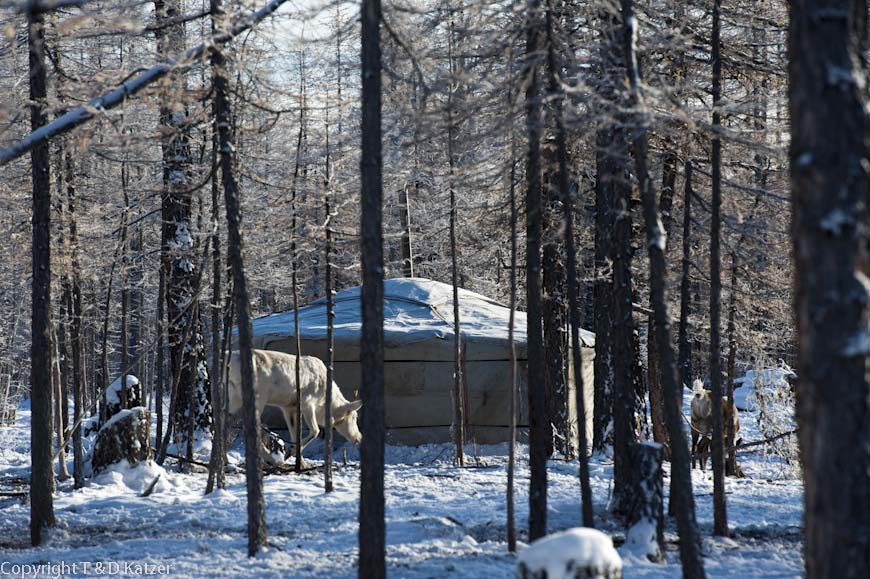
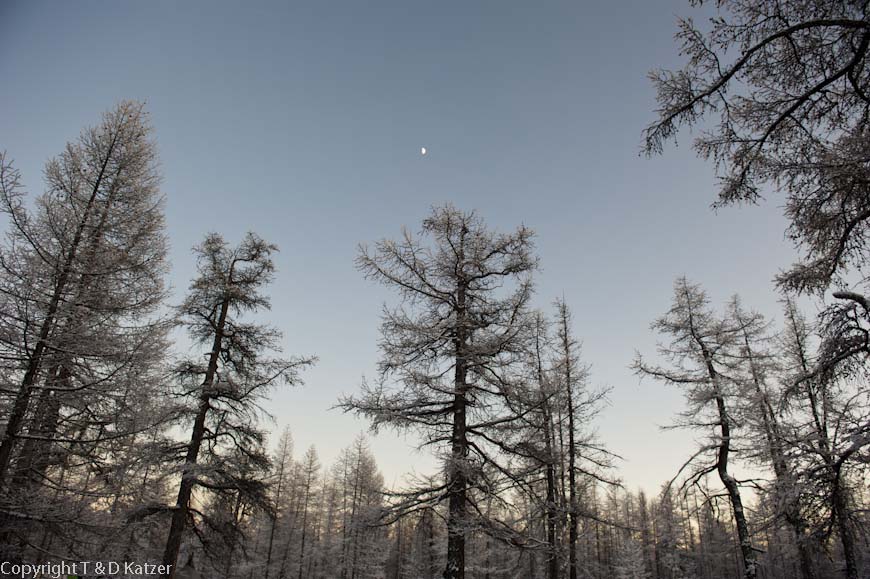

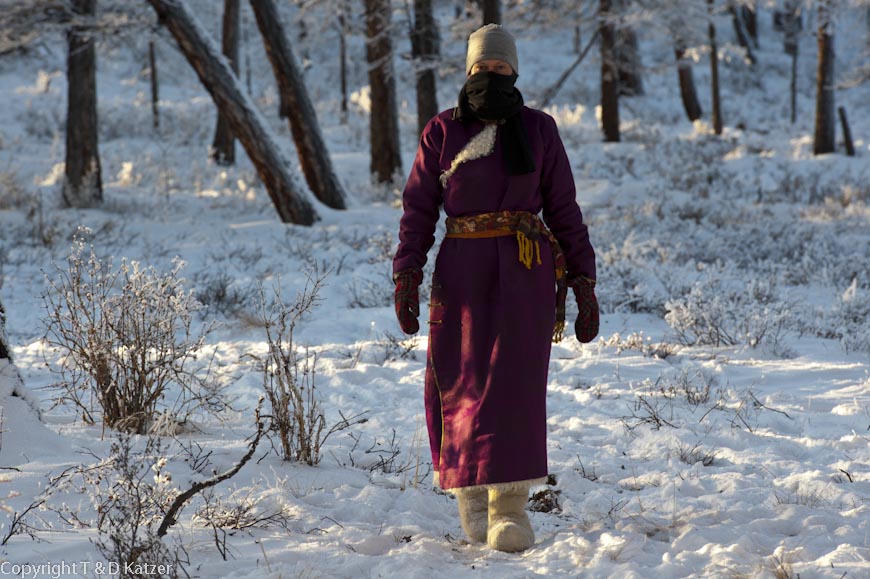

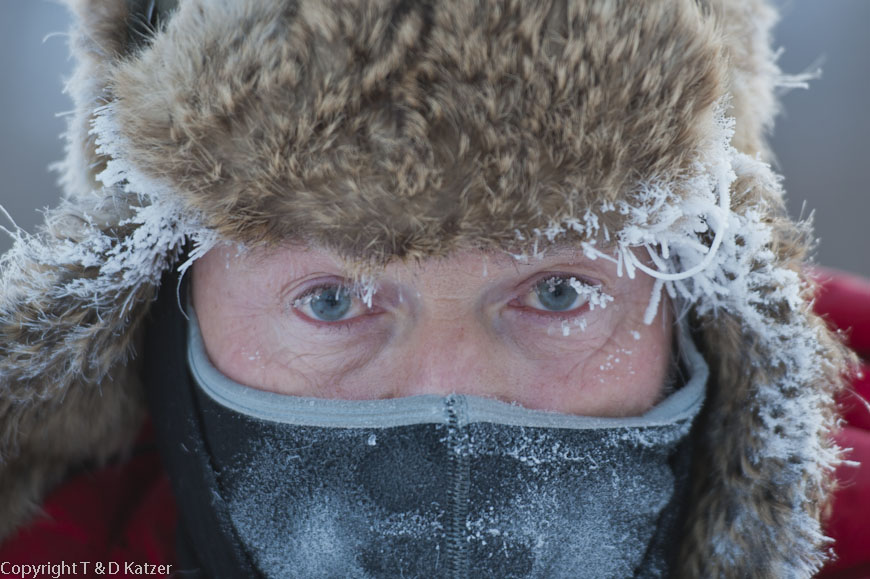

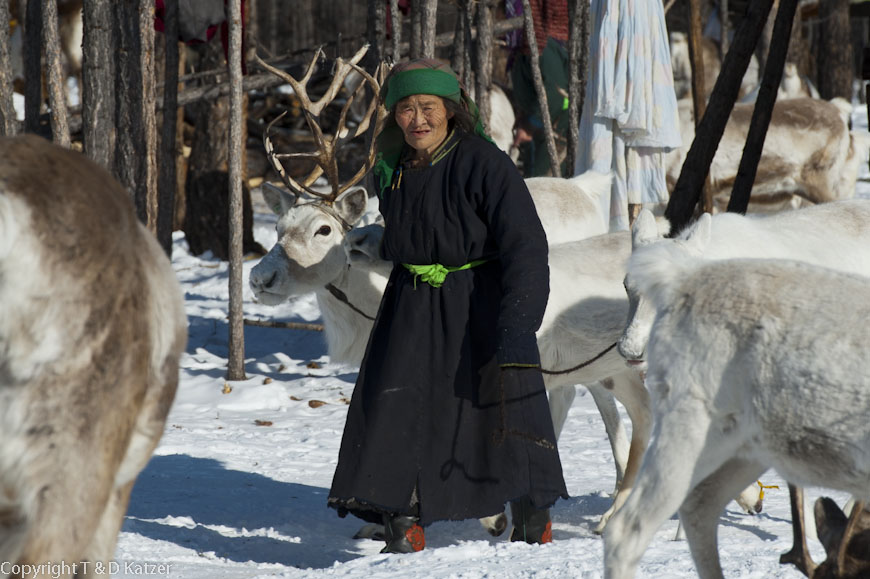
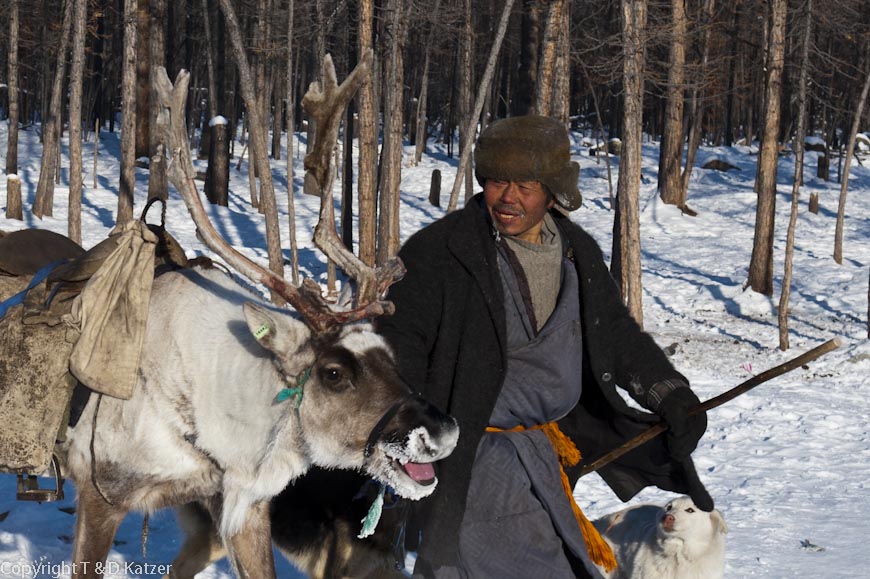

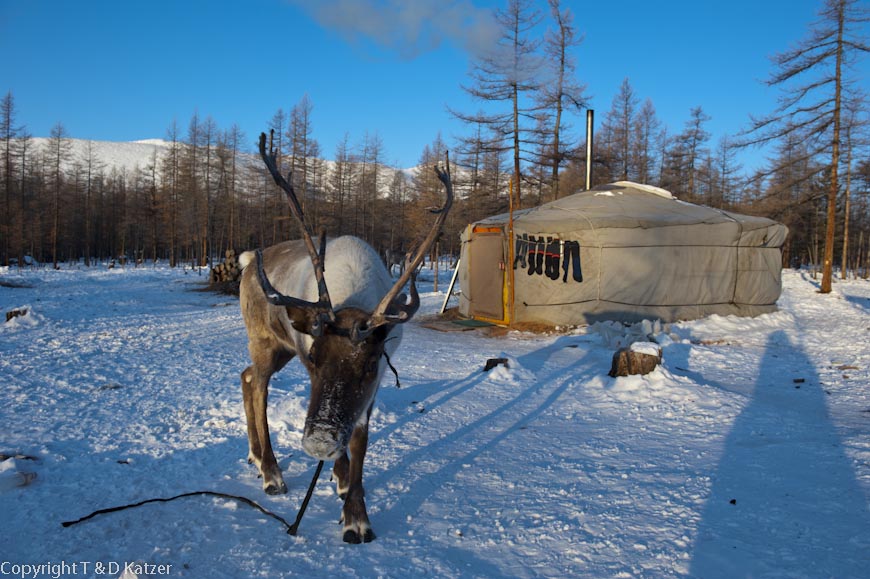
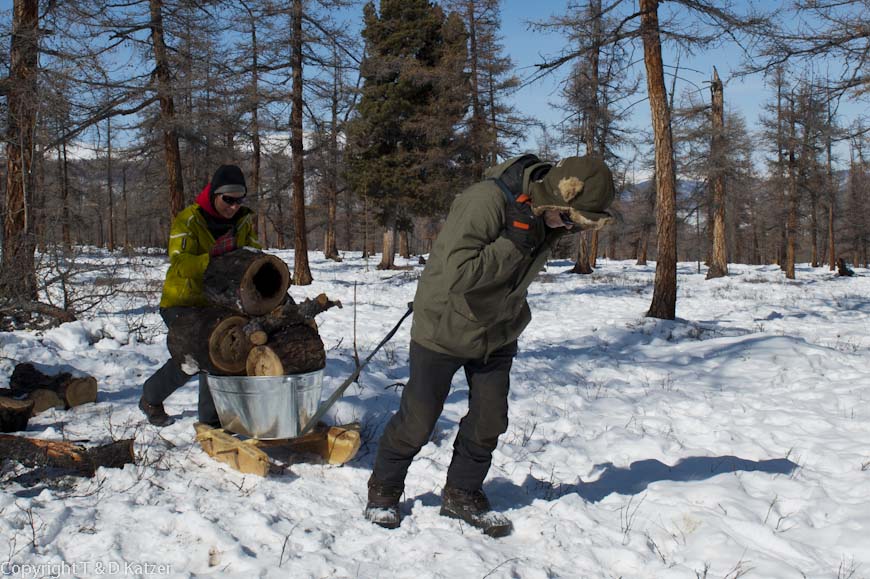
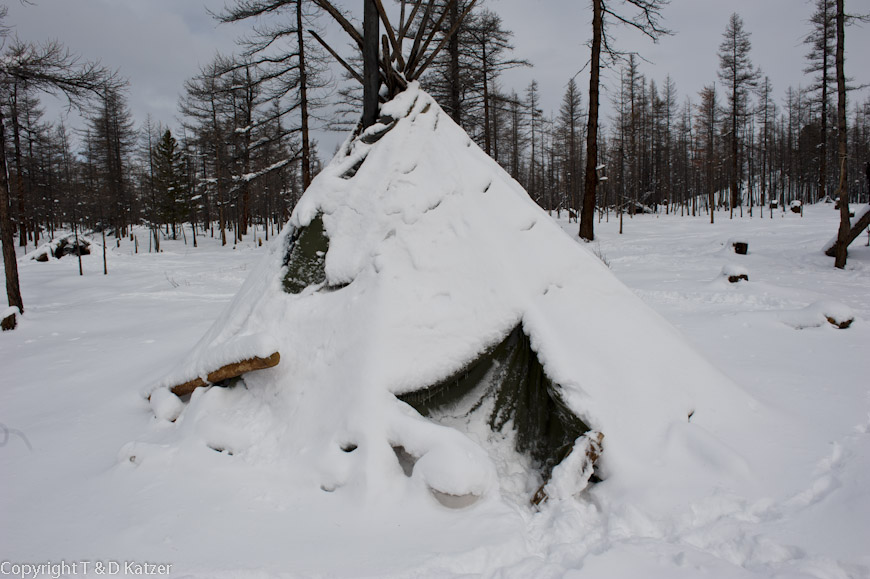

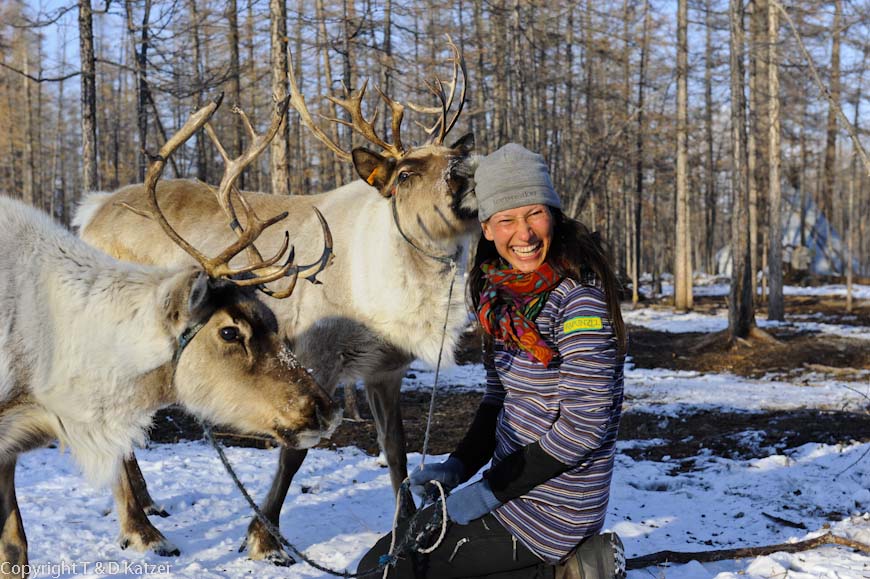
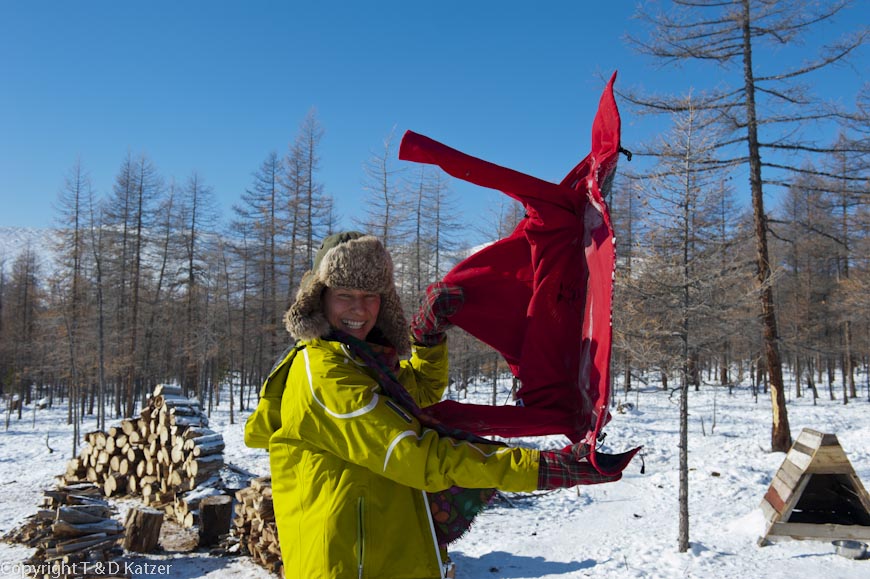
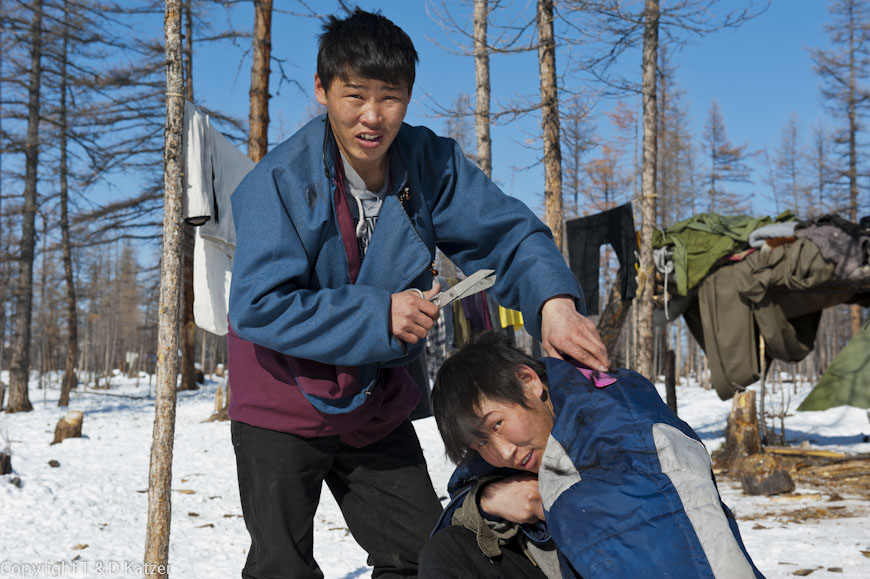
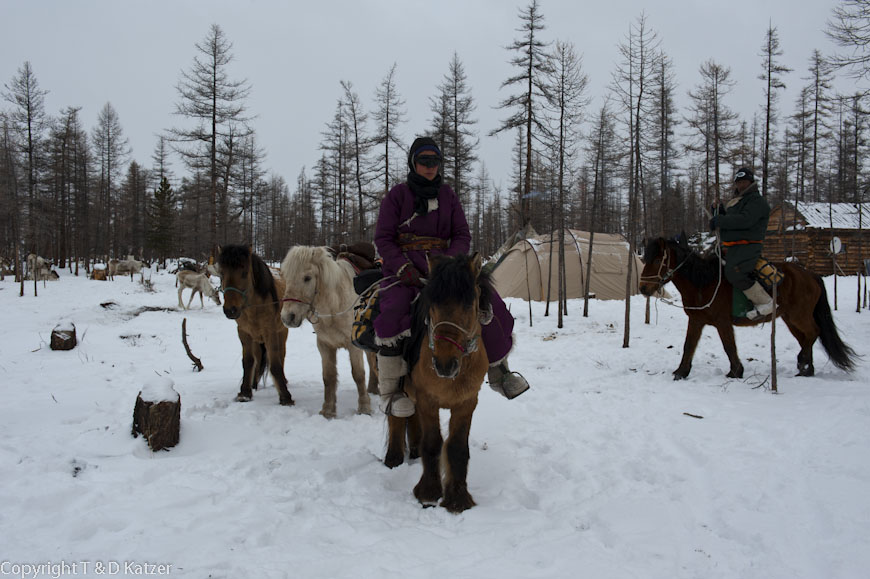
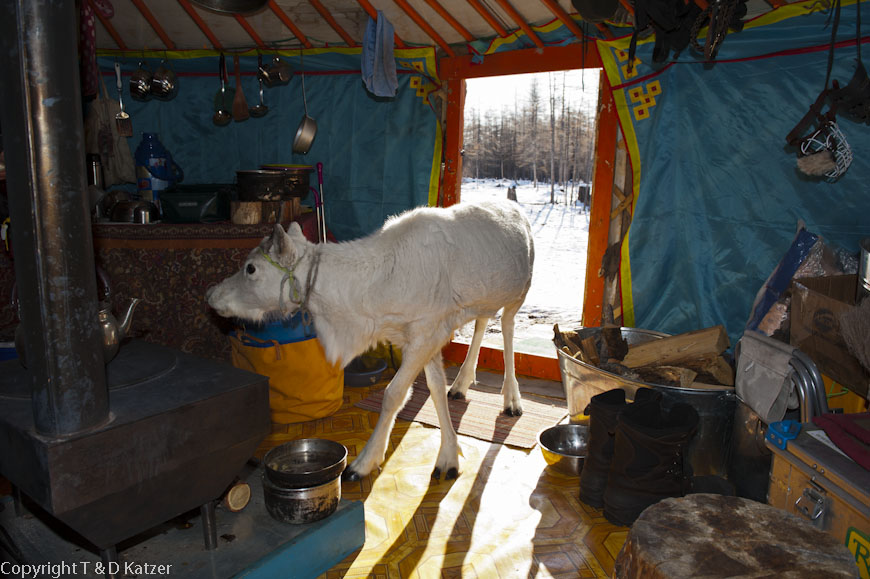
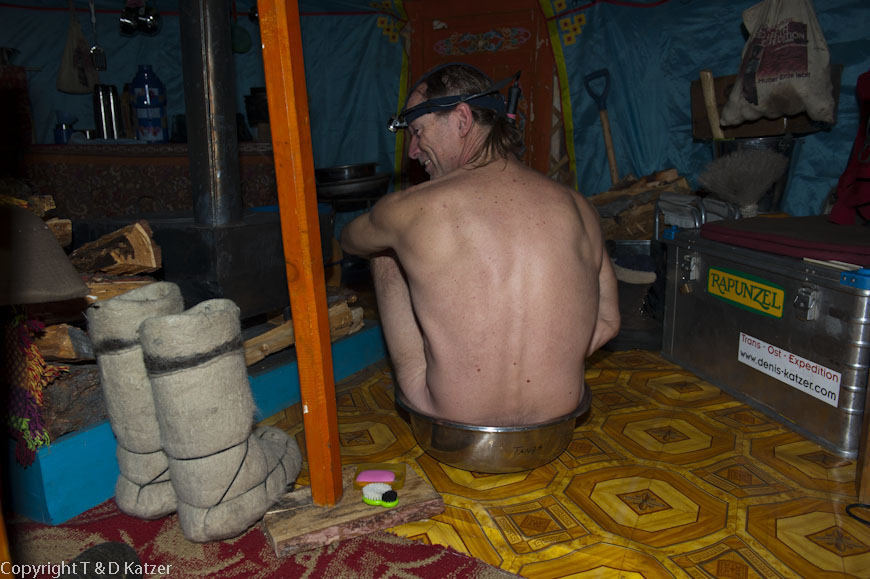


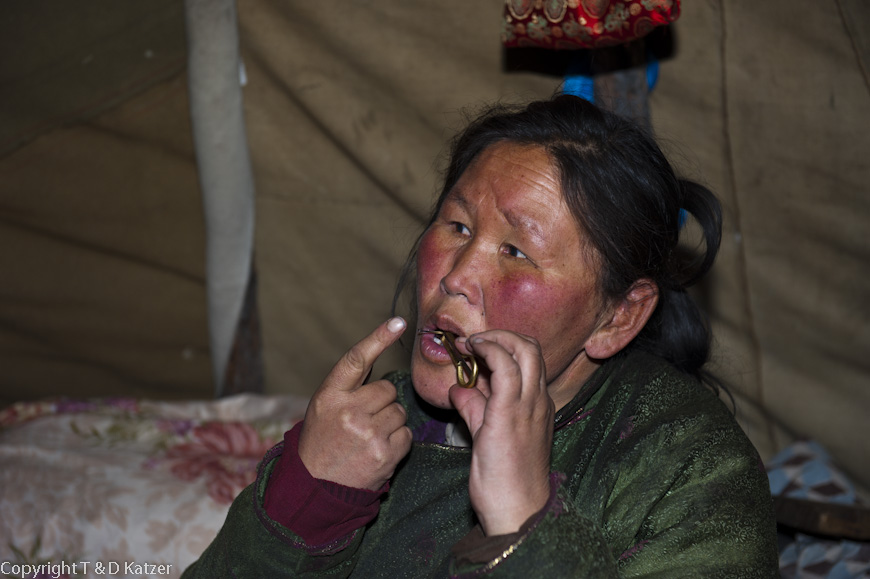

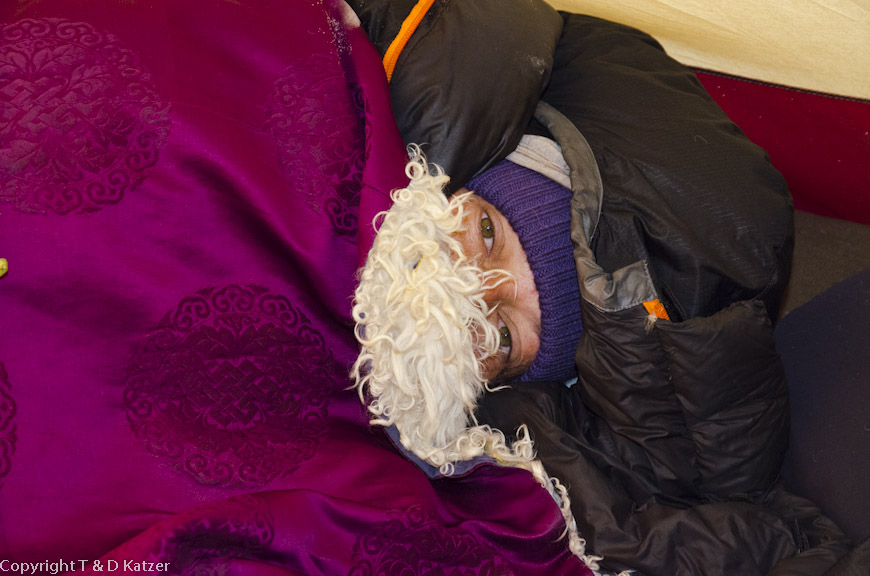

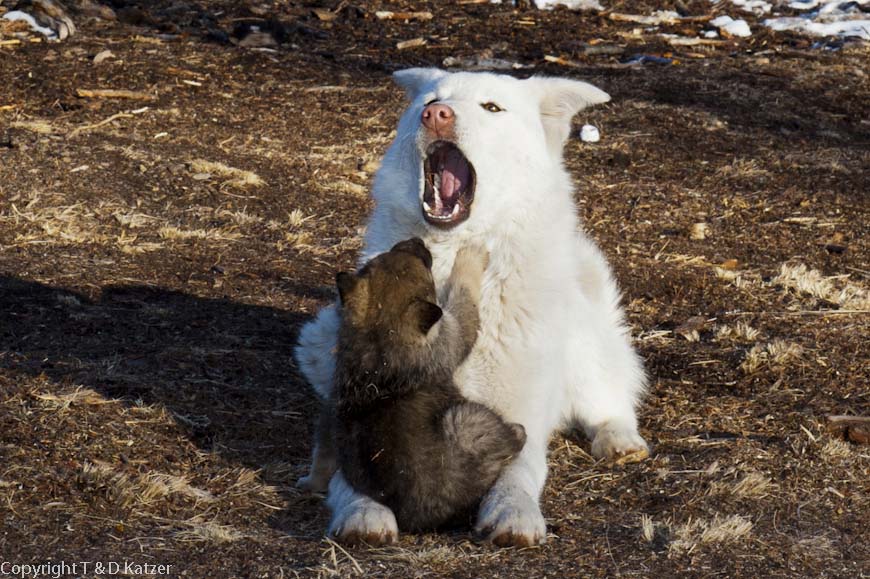
A few days before the turn of the New Year, we left the settlement of Tsagaan Nuur heading northwest in a Russian truck loaded to the brim. The four-wheel drive vehicle crossed snowfields, worked its way through trenches and crevices and penetrated a dense forest. Suddenly we saw the first tipis and two simple log cabins. We had reached the reindeer nomads’ camp. People came out of their tents and greeted us happily. They immediately helped us unload the truck and set up the yurt. When darkness fell, our home was standing.
We already had visitors during the first few days. Sparsely at first, but then more and more frequently. Our yurt quickly became a meeting place for drinking coffee, tea and, in exceptional cases, cocoa. In the evenings, the hunter Ultsan and his wife Tsaya often visited us. As the fire crackled, we listened to stories about the dangerous bear hunt, about rival shamans who tried to kill each other in battle. We heard about the constant threat of wolves and learned a lot about the hard life when there was no contact with the outside world. The exciting, sometimes hair-raising stories enriched the cold winter nights for weeks.
We gave sparklers to everyone present and celebrated the transition into 2012 with them under a clear starry sky and lots of laughter. We learned the most diverse rules of conduct, submitted to the many taboos, ate the bear’s meat, tasted its unconventional tasting fat and experienced two earthquakes.
Every evening, the Tuwa brought their reindeer from the taiga to the camp and tied them to trees next to their tipis. Soon one or more stags were always missing, so the hunters jumped on the back of one of their reindeer to look for them in the forest. They were only safe from the wolves once the missing persons were in the safe camp. Sometimes the blackness of the night was shattered by a loud shot. One of the hunters had shot at a wolf approaching the camp. Occasionally, one of the valuable reindeer fell victim to wolves.
We learned about dubious aid organizations that collect money in the name of the Tuwa, which never reaches the people. In many conversations, the nomads explained to us what help is really needed and how various politicians are basking in the publicity of nonsensical aid campaigns. Diseases are a particular challenge in this remote location. From the age of thirty, many hunters suffer from increasing vision loss due to the use of poor quality sunglasses. In conjunction with our glasses sponsor, we helped the men of the tribe and equipped them with high-quality sunglasses. It is not uncommon for the men to suffer frostbite to their noses, ears, cheeks, fingers and toes during their hunting trips. But dental and cardiovascular problems as well as high blood pressure are also part of everyday life. In many cases, the low-vitamin, simple and one-sided diet and above all the enormous consumption of bad vodka are responsible for this. Our friend Tsaya even carried a dead baby under her heart because of the unbalanced diet. When she reached a hospital after an exhausting journey lasting several days, her body was already poisoned. She fought for her life for a month. She still felt the consequences of this terrible event when we were living in the camp. Her heart became inflamed, which is why she ended up in intensive care again. Their continued survival in the taiga is still dependent on medication, which is expensive and unavailable in Mongolia.
Our time with the nomads was characterized by highs and lows. Due to the extreme temperatures, our entire technology broke down again. Self-help was necessary because otherwise there was no help for such luxury problems. Our relationship with people became more and more intimate. Nobody thought about sending us away after a month. “You are good people,” they said. “Why don’t you join us for spring and fall camp? You’ve become part of the tribe.”
We invited the whole tribe to my birthday party. With snacks, beer and vodka, it was one of my most bizarre and unforgettable celebrations. When a mounted Mongolian border patrol showed up to search the Tuwa for illegal weapons, two hunters hid their rifles under our bunk bed. We didn’t feel comfortable with it, but we were able to prove to them that we were on their side.
Again and again, the men set off with their reindeer to hunt. Meat and flour is the basis of their diet. When they arrived successfully at the camp after days, but sometimes only after weeks, there was always a big hello, because once, as we ourselves experienced, one of them was killed by an avalanche.
As soon as the hunters were in camp, the meat was immediately divided up and Ultsan always gave us a share. When I tried to refuse, he explained: “If a hunter does not divide his prey among the members of his tribe, the gods will no longer be kind to him on the next hunt.”
One day, in temperatures of minus 35 °C, all the men of the tribe soon set off to build a protective wall against wolves 100 kilometers away. The sight of the reindeer caravan loaded with blankets, stoves, tarpaulins, pots and other equipment necessary for survival took us back to a long-forgotten time. The fence, made of branches and wood, stretched from one mountain edge to the other, closing off a high valley in which the entire Tuwa reindeer herd grazed. In this way, the animals should be able to feed on fresh lichen. After 18 days, the nomads returned frozen, starving and exhausted. Their wives were overjoyed to be able to embrace their husbands again. Unfortunately, the work was in vain. When wolves overcame the barrier and killed some deer, the Tuwa brought their reindeer back to the tipi camp.
Ultsan told us about the sudden death of the reindeer. “From 1996 to 2000, we lost everything we owned. A terrible epidemic from Russia took them away.” We learned that it will take another ten years to reach the old stock. Since then, the nomads have sought other sources of income, such as the illegal mining of jade stones. Although the jade sites are located in Tuvan territory, they now attract hundreds of Mongolian fortune hunters. “The Mongols arrive with modern equipment and only leave us the leftovers,” they reported.
A week before the country’s biggest festival, Tsagaan Sar, the Mongolian New Year, many of the Tuvan men were already drunk. Some of them drank until they fell unconscious or vomited blood. Due to the loneliness and seclusion, every celebration was welcome, mostly to escape into another world. The shaman Gamba and his wife Purvee took us into each tipi on the main festival day. Presents were distributed, buuz (meat-filled dumplings) were eaten and lots of vodka was drunk. We couldn’t resist either, we received presents, ate and drank until our bellies were almost bursting.
One evening, in the middle of the night, there was thunder against our yurt door. One of the drunken men demanded vodka. To emphasize the point, he struck the thin wood with a heavy stick. I held the door shut from the inside with all my strength, hoping to stop the hunter from entering our realm. I will never forget how our hearts beat with excitement and tension that night. The continuous drinking went on for a month. It was only through diplomacy, by withdrawing in good time and keeping calm, that we survived this unpleasant time without suffering any damage.
But not only drunken Tuwa and Mongols were a challenge out there in the taiga, but also daily survival. Careful handling of the chainsaw when felling trees or never taking off your gloves for too long because your fingers could freeze after a short time. Always work carefully and consciously. The slightest mistake could lead to serious injuries. Once when I was chopping wood, a log flew against my eyebrow. It burst open immediately. Just a few millimeters lower and it would have hit my eye. Luck in misfortune is part of it. As I experienced first-hand, even the most normal affair can end fatally. One night I had to go outside at minus 35 °C to relieve myself. When I looked up, I couldn’t find my way back to the yurt in the absolute darkness. I trudged through the forest only lightly clothed. The strong wind helped to exacerbate the bizarre situation. Guided by my instinct and because I didn’t panic, I found the yurt in time to save myself.
“Do dong! Do dong! Do dong!” we heard drumbeats one evening. We got dressed, left the yurt and crept to the shaman’s log cabin. As we opened the heavy wooden door, we listened to strange singing and saw the shaman in his colorful costume. Small mirrors shimmered on his belt, intended to keep demons out like a protective shield and at the same time serve as a window into another world. Enveloped in a thick fog of incense, he whirled around his own axis, always beating his drum. His sister Buyantogtoh and son Sansar assisted, relatives consulted the spirits and gods he had summoned. The scene unfolding before our eyes was spooky and oppressive.
In the days that followed, we visited the shaman Saintsetseg in her tipi. We wanted to know how she became a shaman. “She started practicing rituals before she finished her training. That was the reason why the tribe was plagued by several deaths. The spirit punishes such acts harshly,” Tsaya told us.
On March 27, the 246th day of our expedition, Bilgee reached Tsagaan Nuur with all the horses. When we saw the half-starved animals we were shocked. We learned about Tulgaa’s long ride back to Mörön and that the military blamed him for the emaciated horses. “If the horses are dry at the beginning of winter, they won’t recover until the summer, no matter what you feed them,” explained Bilgee.
Without luggage, we then rode our horses into the taiga to the Tuwa camp. We decided to take a shortcut as the crow flies. A mistake. Under small islands of snow lay sharp-edged rocks, holes up to ½ meter deep and countless lichen-covered humps of earth that made progress almost impossible. Then night fell. At minus 25 °C, in the light of our headlamps, we rode through dense undergrowth and bushes. The labyrinth of trees made orientation almost impossible. It wasn’t until 10 p.m. that we came across reindeer tracks that led us to the Tuwa camp.
On April 16, we dismantled our yurt and had it transported to Tsgaan Nuur in a four-wheel drive minibus. Much too early, as it turned out, as the Tuwa only decided to move to the spring camp two weeks later due to persistently bad weather. We moved into the tent, cooked outside at minus 25 °C and froze terribly. From this point onwards, the Tuwa fared much better in their tepees. At my request, Ultsan set up his replacement tipi for us, which we moved into. Unexpectedly, the gates of heaven opened and smothered the land in snow. Every morning we really had to dig ourselves out of the tipi. Then fate struck again. “Tanja! Denis! Naraa has a problem!” Bilgee’s call woke us from our deep sleep. “What? Who?” we stammered. “Naraa!!!” Bilgee shouted again and disappeared into the forest. The heavily pregnant mare Naraa was lying in an ice ditch and was unable to get out under her own steam. Her whole body was shivering from the cold. With the combined strength of many Tuwa men, we put her on her feet and hoped that her unborn child had not been harmed.
And then the time had finally come. The nomads moved into their spring camp. We were just about to get into the saddles when Naraa’s waters broke and a piece of foal popped out of her cervix. We immediately dropped everything and helped the mare give birth. Tuya, as we called the newborn, slipped into the cold snow and shivered all over. “It’s alive!” we shouted enthusiastically. We put Tuya on a blanket, carried him into the tepee and dried his wet fur. Then we took him back to his mother.
At the end of April, the last nomads moved into their spring camp with an impressively large reindeer caravan. All the animals were loaded to the brim with the Tuwa’s household goods. Bilgee and I accompanied them. As the newborn was still too weak for such a long walk, Tanja was the only one left behind in the winter camp. Bilgee wanted to ride back to the winter camp the following day to offer Tanja protection in the wild taiga. As I wanted to document the spectacular and unique procession of the reindeer nomads photographically, it was me who accompanied them and not Tanja.
We look forward to your comments!

